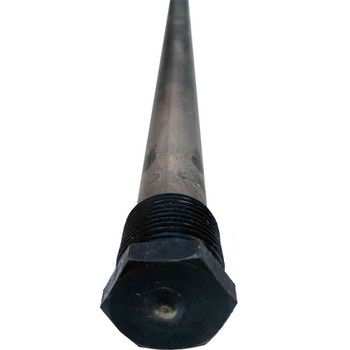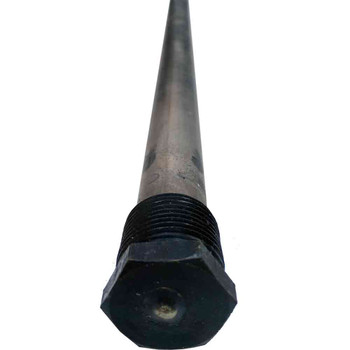Magnesium Anode
-

Hot Water Heater Replacement Anode - 1210mm Magnesium
plumbonline
$143.00Hot Water Heater Replacement Anode - 1210mm Magnesium What do you get? 1 x 1210mm Long Magnesium Anode 3/4" BSP thread Delivery to your door Could your Expensive Hot Water Tank be rusting away? A Sacrificial Anode in a hot water tank is manufactured...$143.00 -

Flexible Hot Water Heater Replacement Anode - 1510mm Magnesium
plumbonline
$157.00Flexible Hot Water Heater Replacement Anode - 1510mm Magnesium What do you get? 1 x 1510mm Long Flexible Magnesium Anode 3/4" BSP thread Delivery to your door Could your Expensive Hot Water Tank be rusting away? A Sacrificial Anode in a hot water...$157.00 -

Hot Water Heater Replacement Anode - 500mm Magnesium
plumbonline
$67.00Hot Water Heater Replacement Anode - 500mm Magnesium What do you get? 1 x 500mm Long Magnesium Anode 3/4" BSP thread Delivery to your door Could your Expensive Hot Water Tank be rusting away? A Sacrificial Anode in a hot water tank is...$67.00 -

Hot Water Heater Replacement Anode - 1510mm Magnesium
plumbonline
$151.00Hot Water Heater Replacement Anode - 1510mm Magnesium What do you get? 1 x 1510mm Long Magnesium Anode 3/4" BSP thread Delivery to your door Could your Expensive Hot Water Tank be rusting away? A Sacrificial Anode in a hot water tank is manufactured...$151.00 -

Flexible Hot Water Heater Replacement Anode - 1686mm Magnesium
plumbonline
$166.00Flexible Hot Water Heater Replacement Anode - 1686mm Magnesium What do you get? 1 x 1686mm Long Flexible Magnesium Anode 3/4" BSP thread Delivery to your door Could your Expensive Hot Water Tank be rusting away? A Sacrificial Anode in a hot water...$166.00 -

Flexible Hot Water Heater Replacement Anode - 1210mm Magnesium
plumbonline
$149.00Flexible Hot Water Heater Replacement Anode - 1210mm Magnesium What do you get? 1 x 1210mm Long Flexible Magnesium Anode 3/4" BSP thread Delivery to your door Could your Expensive Hot Water Tank be rusting away? A Sacrificial Anode in a hot water...$149.00 -

Hot Water Heater Replacement Anode - 1686mm Magnesium
plumbonline
$160.00Hot Water Heater Replacement Anode - 1686mm Magnesium What do you get? 1 x 1686mm Long Magnesium Anode 3/4" BSP thread Delivery to your door Could your Expensive Hot Water Tank be rusting away? A Sacrificial Anode in a hot water tank is manufactured...$160.00 -

Hot Water Heater Replacement Anode - 800mm Magnesium
plumbonline
$70.00Hot Water Heater Replacement Anode - 800mm Magnesium What do you get? 1 x 800mm Long Magnesium Anode 3/4" BSP thread Delivery to your door Could your Expensive Hot Water Tank be rusting away? A Sacrificial Anode in a hot water tank is manufactured from...$70.00 -

Flexible Hot Water Heater Replacement Anode - 800mm Magnesium
plumbonline
$76.00Flexible Hot Water Heater Replacement Anode - 800mm Magnesium What do you get? 1 x 800mm Long Flexible Magnesium Anode 3/4" BSP thread Delivery to your door Could your Expensive Hot Water Tank be rusting away? A Sacrificial Anode in a hot...$76.00 -

Hot Water Heater Replacement Anode - 280mm Magnesium
plumbonline
$61.00Hot Water Heater Replacement Anode - 280mm Magnesium What do you get? 1 x 280mm Long Magnesium Anode 3/4" BSP thread Delivery to your door Could your Expensive Hot Water Tank be rusting away? A Sacrificial Anode in a hot water tank is manufactured from...$61.00 -

Hot Water Heater Replacement Anode - 230mm Magnesium
plumbonline
$59.00Hot Water Heater Replacement Anode - 230mm Magnesium What do you get? 1 x 230mm Long Magnesium Anode 3/4" BSP thread Delivery to your door Could your Expensive Hot Water Tank be rusting away? A Sacrificial Anode in a hot water tank is manufactured from...$59.00 -

Flexible Hot Water Heater Replacement Anode - 500mm Magnesium
plumbonline
$65.00Flexible Hot Water Heater Replacement Anode - 500mm Magnesium What do you get? 1 x 500mm Long Flexible Magnesium Anode 3/4" BSP thread Delivery to your door Could your Expensive Hot Water Tank be rusting away? A Sacrificial Anode in a hot water tank...$65.00 -

Hot Water Heater Replacement Anode - 2350mm Magnesium
plumbonline
$193.00Hot Water Heater Replacement Anode - 2350mm Magnesium What do you get? 1 x 2350mm Long Magnesium Anode 3/4" BSP thread Delivery to your door Could your Expensive Hot Water Tank be rusting away? A Sacrificial Anode in a hot water tank is manufactured...$193.00 -

Hot Water Heater Replacement Anode - 1950mm Magnesium
plumbonline
$169.00Hot Water Heater Replacement Anode - 1950mm Magnesium What do you get? 1 x 1950mm Long Magnesium Anode 3/4" BSP thread Delivery to your door Could your Expensive Hot Water Tank be rusting away? A Sacrificial Anode in a hot water tank is manufactured...$169.00
Hot Water Heater Replacement Anode MAGNESIUM
Rod and Flexible types
Could your Expensive Hot Water Tank be rusting away?
A Sacrificial Anode in a hot water tank is manufactured from a metal alloy with a greater negative electrochemical potential than the metal it will be used to protect, in this case your hot water tank. The sacrificial anode corrodes instead of your hot water tank, SIMPLE! Magnesium and aluminum are the two types used by the hot water tank manufacturers, plumbonline stock the full range of sizes in "rod" straight and "flexi" which can be bent for easy replacement were access is an issue. Water heater tanks are notorious for rusting out especially in certain water conditions. Once the tank rusts through, there is only one solution - replacement.
All water heaters leave the manufacturers already fitted with at least one sacrificial anode to protect against rusting. The sole purpose of the anode is to corrode away instead of the tank. Checking the anode at least every 3-5 years or earlier depending on your water quality and replacing if necessary will add to the life of your water heater at a very small cost. Not to mention avoiding the inconvenience of having a new water heater installed, there is never a convenient time for this to happen.
What is a Sacrificial Anode?
The anode is a metal rod usually magnesium, aluminum or zinc. The anode is usually screwed into the top of the tank or built into a special holder, plumbonline stock Aluminium or Magnesium anodes in "rod" or flexi" format.
How does it work?
Electrolysis eats away the metal anode instead of the metal of the tank. Once the anode is gone the electrolysis will then attack the tank and it will begin to corrode. If your water heater has an annual service agreement it is a good idea to ask your licensed plumber to check the anode during the service call.
